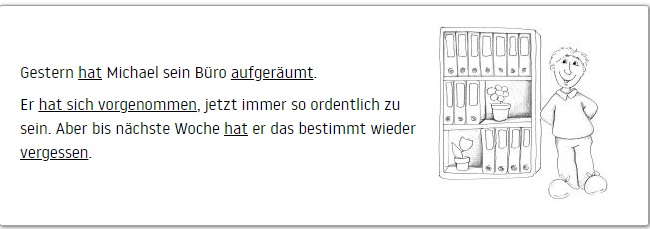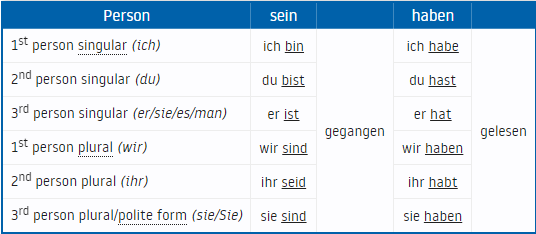Perfekt – Perfect Tense in German Grammar

The perfect tense In German, also called present perfect (Perfekt), is a past tense. We use it to speak about actions completed in the recent past. In spoken German, the present perfect tense is often used instead of the past tense. We can translate the perfect tense using the English simple past tense.
Master the rules of conjugation for the perfect tense online and get tips on when and how to use it. Learn to conjugate irregular German verbs and test your knowledge in the exercises.
Perfekt – Perfect Tense in German Grammar
The perfect tense In German, also called present perfect (Perfekt), is a past tense. We use it to speak about actions completed in the recent past. In spoken German, the present perfect tense is often used instead of the past tense. We can translate the perfect tense using the English simple past tense.
Example

Usage
We use the German perfect tense to express:
- a completed action in the past with the focus on the result of the action.
Example: Gestern hat Michael sein Büro aufgeräumt.
*Result: the office is clean now.
Er hat sich vorgenommen, jetzt immer so ordentlich zu sein.
*Result: he doesn’t want to be so disorganised anymore
- an action that will be completed by a certain point in the future.
Example: Bis nächste Woche hat er das bestimmt wieder vergessen.
*The point in the future must be specifically designated, otherwise we use the future perfect.
Conjugation of German Verbs in Perfect Tense
To conjugate verbs in the perfect tense we need the present tense form of sein/haben and the past participle (Partizip II).

When to Use Haben or Sein
The verbs haben and sein are used as auxiliary or helping verbs in the present perfect. Sometimes it can be difficult to know which verb to use. Luckily, there are a few rules for the usage of haben and sein in the German present perfect tense.
We use haben to conjugate the present perfect with:
- verbs that take an accusative object
Example: Michael hat das Büro aufgeräumt.
- verbs without an accusative object that don’t express a change of state or place
Example: Er hat aufgeräumt.
- reflexive verbs
Example: Das Büro hat sich verändert.
We use sein to conjugate the present perfect with:
- verbs of movement that don’t take an accusative object: gehen, laufen, fahren, fallen, fliegen, kommen, reisen, stolpern, stürzen
Example: Alle Kollegen sind in sein Büro gekommen.
- verbs that express a change of state: aufwachen/erwachen, einschlafen, gefrieren, tauen, sterbn, zerfallen
Michaels Ordungsliebe ist erwacht.
- the following verbs: bleiben, geschehen, gelingen, misslingen, sein, werden
Example: Was ist mit Michael geschehen?
Past Participle
The past participle (Partizip II) is formed in the following ways:
Regular Verbs also known as weak verbs (schwache Verben) form the past participle with ge…t and the verb stem.
Example: lernen – gelernt
Irregular verbs are verbs that change their verb stem in simple past and/or the participle form (see list of irregular verb). There are two kinds of irregular verbs in German grammar: strong verbs (starke Verben) and mixed verbs (gemischte Verben).
- Strong Verbs form the past particple with mit ge…en.
Example: sehen – gesehen (sehen-sah-gesehen)
gehen – gegangen (gehen-ging-gegangen)
- Mixed Verbs form the past participle with ge…t.
Example: haben – gehabt (haben-hatte-gehabt)
bringen – gebracht (bringen-brachte-gebracht)
Exceptions
- We add an -et to weak/mixed verbs when the word stem ends in d/t.
Example: warten – gewartet
- Verbs that end in -ieren form their past participle without ge.
Example: studieren – studiert
- Inseparable verbs form the past participle without ge.
Example: verstehen – verstanden
- For separable verbs, the ge comes after the prefix.
Example: ankommen – angekommen
At last you can improve your German with Learning German App.




























